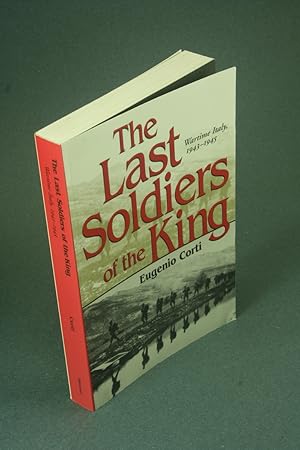corti eugenio 1921 2014 (2 Ergebnisse)
Produktart
- Alle Produktarten
- Bücher (2)
- Magazine & Zeitschriften
- Comics
- Noten
- Kunst, Grafik & Poster
- Fotografien
- Karten
-
Manuskripte &
Papierantiquitäten
Zustand
- Alle
- Neu
- Antiquarisch/Gebraucht
Einband
- alle Einbände
- Hardcover
- Softcover (1)
Weitere Eigenschaften
- Erstausgabe (1)
- Signiert (1)
- Schutzumschlag
- Angebotsfoto (1)
- Kein Print-on-Demand
Land des Verkäufers
Verkäuferbewertung
-
The last soldiers of the King: wartime Italy, 1943-1945. Translated by Manuela Arundel ; foreword by Carlo D'Este
Verlag: Columbia: University of Missouri Press, 2003, 2003
Anbieter: Steven Wolfe Books, Newton Centre, MA, USA
Erstausgabe Signiert
PAPERBACK, attractive copy, very good. CORTI, EUGENIO. The last soldiers of the King: wartime Italy, 1943-1945. Translated by Manuela Arundel ; foreword by Carlo D'Este. Columbia: University of Missouri Press, 2003, 1st printing number line ending in 1, ix, 329pp., . "In the sequel to the highly acclaimed Few Returned, Eugenio Corti, one of Italy's most distinguished postwar writers, continues his poignant account of his experiences as an Italian soldier in the Second World War. In the earlier book, Corti, a twenty-one-year-old lieutenant of artillery, recounts the horrifying experience of the soldiers who were sent to Russia to fight alongside their German ally. On the River Don, the Red Army surrounded Corti and the other members of the Italian force. Of the 30,000 men in the Thirty-fifth Corps, Corti was one of only an estimated 4,000 soldiers to survive the ordeal. Mussolini's dreams of empire were shattered, and his ill-fated Eighth Army no longer existed.", "In 1943, after recurrent military defeats, the Italian government and its king, Victor Emmanuel III, forced Mussolini to resign. Italy then signed an armistice with the Allies and ended its alliance with Germany. The Germans immediately occupied northern Italy, which the Axis still held, and reinstated Mussolini in the north. Some Italians remained loyal to facism; many others aligned themselves with the Allies, who were now advancing in southern Italy. Corti's sympathies were with the Allies, and after a harrowing escape from the German-occupied north, he rejoined the Italian Army fighting on the side of the king. The Last Soldiers of the King is Corti's account of the Italian Army's experiences fighting the Germans during the remainder of the war.", "In this narrative, Corti depicts the war from the perspective of the average Italian soldier, capturing its boredom and absurdity along with brief periods of savagery, terror, and death. Painting vivid pictures of the sights, sounds, and smells of war, he shows how those men fought alongside the Allies against the Germans. They fought without hatred, driven by a sense of duty and love for their country and a desire to quickly put an end to a war that was destroying so many lives. Corti superbly relates the wandering of the remnant of Italian officers and men, as they sought to reestablish themselves as Italian soldiers., The Last Soldiers of the King tells the story of a proud people forced to endure death, poverty, and the virtual destruction of their nation.". 9780826214911 ISBN 0826214916.
-
IL CAVALLO ROSSO. Romanzo. 2ª ed.
Verlag: Edizioni Ares, Milano, 1984
Anbieter: Libreria Le Colonne, TORINO, TO, Italien
Spesso vol. in-8° (cm. 20,7x14,1), pp. 1277, (2). Bross. edit. ill. a col. Il discusso capolavoro del conservatore e antidivorzista cattolico CORTI, grande affresco storico-autobiografico-ideologico sulle vicende dal 1940 al 1974 in BRIANZA e in Italia, elaborato dal 1972 al 1983 con lungo lavoro di documentazione storica, necessario per un romanzo che abbraccia gran parte del Novecento; ebbe molte traduzioni e 27 edizioni (2010). In 3 parrti: a) "Il cavallo" prima parte della guerra (anni 1940-1943); b) "Il cavallo livido", sul biennio 1943-1945 con la scoperta dei gulag, la bestialità delle repressioni naziste e la guerra civile italiana; c) "L'albero della vita", dopoguerra, Sessantotto, il diffondersi della droga e il terrorismo.



